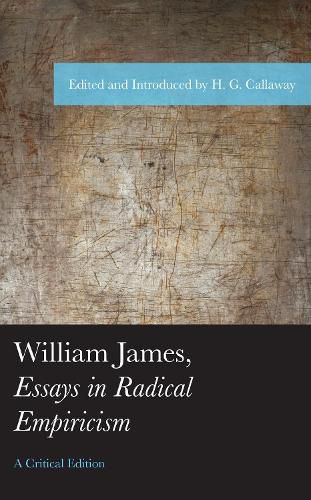Readings Newsletter
Become a Readings Member to make your shopping experience even easier.
Sign in or sign up for free!
You’re not far away from qualifying for FREE standard shipping within Australia
You’ve qualified for FREE standard shipping within Australia
The cart is loading…






This book is a critical edition of William James’s Essays in Radical Empiricism. The text has been annotated to explain and expand on James’s references and to briefly develop points of criticism. The editor has added a new, critical Introduction, an extended bibliography and a new, comprehensive index. William James is perhaps America’s favorite philosopher and his writings remain popular around the world. Yet he studied to be an M.D., taught anatomy and physiology at Harvard, and he came to international prominence with his magnum opus, The Principles of Psychology (1890). James represented America just as the U.S. arrived on the world stage. This critical edition examines James’s later philosophical work from the perspective of the scientific naturalism often prominent in the Principles. It also takes up developments in historical and contemporary sources of functional psychology-which James often inspired-up to and including reflections of the contemporary French neuroscientist Stanislas Dehaene. The aim is to place the evaluation of James on pragmatism and radical empiricism within the scientific perspective of contemporary work in the philosophy of psychology and the philosophy of mind. James on radical empiricism and pure experience and pragmatism are particular topics of critical attention.
$9.00 standard shipping within Australia
FREE standard shipping within Australia for orders over $100.00
Express & International shipping calculated at checkout
This book is a critical edition of William James’s Essays in Radical Empiricism. The text has been annotated to explain and expand on James’s references and to briefly develop points of criticism. The editor has added a new, critical Introduction, an extended bibliography and a new, comprehensive index. William James is perhaps America’s favorite philosopher and his writings remain popular around the world. Yet he studied to be an M.D., taught anatomy and physiology at Harvard, and he came to international prominence with his magnum opus, The Principles of Psychology (1890). James represented America just as the U.S. arrived on the world stage. This critical edition examines James’s later philosophical work from the perspective of the scientific naturalism often prominent in the Principles. It also takes up developments in historical and contemporary sources of functional psychology-which James often inspired-up to and including reflections of the contemporary French neuroscientist Stanislas Dehaene. The aim is to place the evaluation of James on pragmatism and radical empiricism within the scientific perspective of contemporary work in the philosophy of psychology and the philosophy of mind. James on radical empiricism and pure experience and pragmatism are particular topics of critical attention.